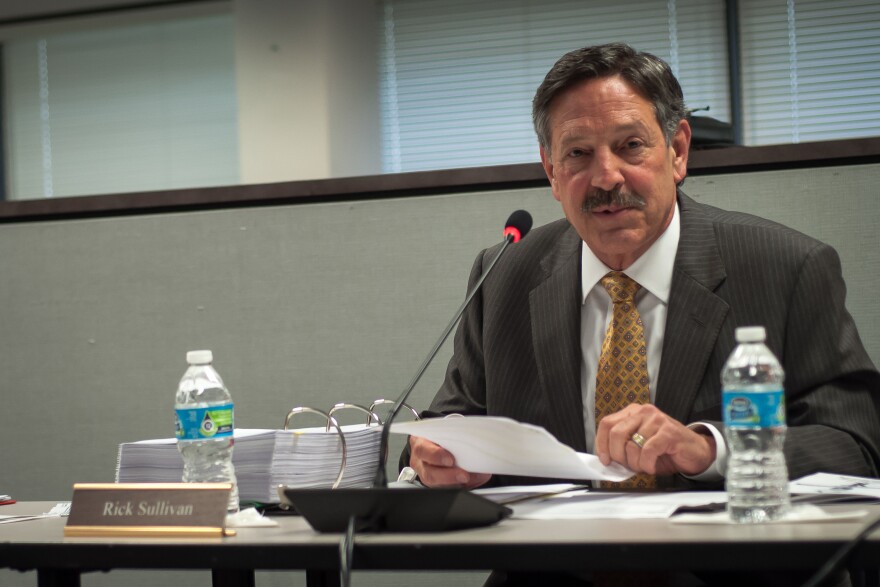St. Louis Public Schools’ elected board of education has continued to hold elections and conduct meetings, even though it’s had no authority over the district for a decade.
The task belongs to a Special Administrative Board, or SAB, which is appointed. As the district moves back to improved academic performance, the three-person SAB has said its time of rule is nearing an end. The governor of Missouri, the mayor of St. Louis and the president of the St. Louis Board of Aldermen each get to select one of the board members.
“We are not interested in staying forever,” Richard Gaines, a member of the SAB, told elected board members last month.
That should come as good news to the elected board, which has long wanted to exercise its authority over the roughly 22,500-children district. But members have expressed frustration with the process.
“I don’t know if I would call it a transition process, at least not a transition process between the elected board and the appointed board,” said Charli Cooksey, a member of the school district’s elected board.
Cooksey, a former Teach For America corps member in SLPS and board member since 2015, is on a task force that’s been set up by the SAB to explore governance of the district.
“We have to internalize what the community is saying and if we don’t, then it’s disrespectful to our young people, it’s disrespectful to our future and potential of our city,” Cooksey said.
Options on the table
The task force, whose members were largely picked by the administrative board and will be chaired by Gaines, will hold three public meetings in the next 10 days to explore governance structures.

Teachers, parents and community leaders make up the rest of panel that will hear pros and cons of three school board structures: Returning to a fully elected board, continuing with the appointed board, or a mix of appointed and elected members on a single “hybrid” board.
It’s been a tumultuous two decades for St. Louis Public Schools. Slumping assessment scores, a loss of students to charter schools, turnover at the superintendent position, and bad finances marred the district in the early 2000s. That lead to a state takeover in 2007 and the implementation of the SAB.
The district’s academic scores have improved in recent years. It regained full accreditation by the state in January for the first time since 2000.
Amid improving student outcomes, efforts last year to transition back to the elected board fizzled out almost as quickly as they began. Infighting hindered closed door meetings, so they were put on hold until after elections in April. This time, state education officials are staying on the sidelines of a process that will be more public.
The two boards have not always gotten along in practice, but SAB member Darnetta Clinkscale said everyone involved is well intentioned.
“I don’t think that there’s any posturing,” she said. “I have a lot of respect for the people who are on that board, as do my fellow board members.”
Sally Topping, president of St. Louis’ teachers’ union, said, however, that the SAB is not treating the elected board with respect.
“I think this is so insulting to us residents of St. Louis city. Let’s face it, this would not happen in a predominantly white place,” she said.
The SAB’s mind is already made up on a hybrid board, Topping contends. “No hybrid board or appointed board beats an elected board, hands down,” she said.
Clinkscale disputes there’s a predetermined outcome.
“We want to see everything we possibly can about all of the different alternatives. So it’s educating us as well as the public,” she said.
Nationwide trend

Appointed boards became trendy in the mid-90s, according to Tom Alsbury, an education professor at Northwest University near Seattle. That’s when dozens of big cities implemented them. A majority have since returned to elected boards.
“It’s clear that the community has preferred having elected boards and has not seen the dramatic improvements that were promised by a takeover of boards,” Alsbury said.
Still, under the SAB’s watch, the district has had a steady superintendent, an improved financial situation and better student outcomes.
“The SAB has done its job and restored some confidence in our district, restored some stability,” said district parent Ami Boehlje.
She’s torn on what’s best for school kids and what’s best philosophically.
“Ideally, we live in a democracy and electing representatives to speak on our behalf is kind of what we’re about,” said Boehlje, the mother of two boys at Metro Academic and Classical High School, a magnet school.
Parents are typically more concerned with how principals and teachers are dealing with their children than board structure, said Emily Koeltzow, a parent with two children at Wilkinson Early Childhood Center.
“I consider myself decently informed and I still feel like I’m trying to wrap my head around the complicated history, the different options on the table, what different scenarios would look like, what it would mean both for the district as a whole and for me as a parent,” said Koeltzow, president of Wilkinson’s PTO.
Regardless on how SLPS governs itself, it will still have to contend with a high proportion of students living in poverty, teacher turnover and declining enrollment.
The task force hopes to make a recommendation about SLPS’s governance to state officials in January.
The meetings are:
- Monday, Nov. 6, from 6:30 - 9:30 p.m. at Vashon High School, 3035 Cass Ave., with a focus on elected boards
- Thursday, Nov. 9, 6:30 - 9:30 p.m. at Central Visual and Performing Arts High School, 3125 S Kingshighway Blvd, with a focus on appointed boards
- Monday, Nov. 13, 6:30 - 9:30 p.m. at Northwest Law Academy, 5140 Riverview Blvd., with a focus on hybrid boards
The task force is also accepting comments online, or by phone at 314-345-7577.
Follow Ryan on Twitter: @rpatrickdelaney




